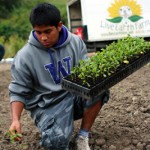 “FOOD, WHAT?!” – Inspiring and Helpful
“FOOD, WHAT?!” – Inspiring and Helpful
Our workload has ratcheted up another notch as summer-crops have started maturing. Green beans, peppers, and cherry tomatoes have been added to the weekly harvest list. The increasing number of tasks mimics the abundance in the field and since most of them are manual by nature, work often starts at dawn and sometimes doesn’t stop until dusk.
Growing fruits and vegetables relies mostly on manual labor, crops are hand-planted, hand-weeded, hand-pruned, hand-picked, hand-dug, hand-bunched, hand-sorted, hand-washed, hand-packed, and then hand-loaded on and off the delivery truck. That’s a lot of handling before and after a seed has metamorphosed into any of the dozen or so produce items in your weekly CSA share.

With all that manual workload you can imagine how welcome a helping hand is at this time of year here on the farm. The last 6 weeks we have enjoyed such help from a wonderful group of teens. Every Friday, at 9 o’clock in the morning, 20 youths from the “Food, What?!” program gather in a circle under the giant oak tree by the barn ready to take on the field tasks scheduled for that day. Planting, weeding or harvesting, these kids don’t shy away from working in the fields.
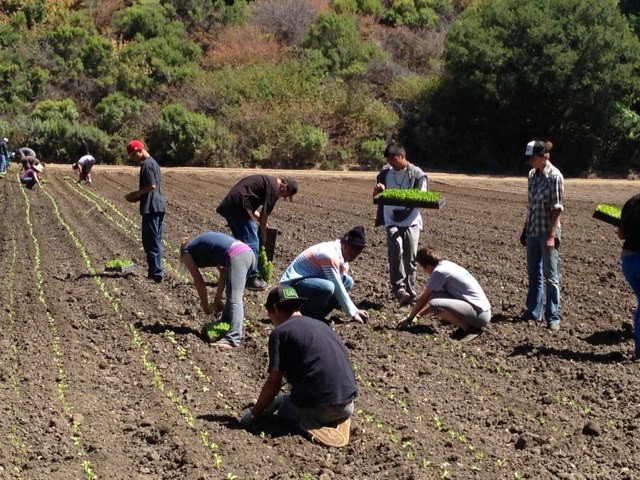
“Food, What?!” I like the name; it’s an important question, one that is at the core of our well-being, the question to understand our connection to food and where it comes from.
Both the Farm’s Discovery Program and “Food What!” share common goals of youth empowerment and farm-based education. On their website “Food What?!” is described as a “… youth empowerment and food justice program using food, through sustainable agriculture and health, as the vehicle for growing strong, healthy, and inspired teens. The program partners with low-income and at-risk youth to grow, cook, eat, and distribute healthy, sustainably raised food and address food justice issues in our community. Youth from Watsonville to Santa Cruz join the FoodWhat Crew through Spring Internships, Summer Jobs, Fall Business Management positions, and leading big community events. It’s an opportunity for youth to engage in leadership development, personal growth, and job training”.
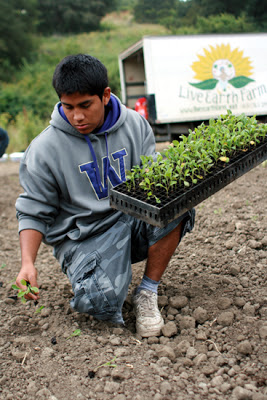
What is exciting and unique about this partnership between Live Earth Farm’s Discovery Program and “Food, What?!” is that the teens can engage in the operation of a real working farm, where they work side by side with 30 hardworking farm employees, experiencing literally from the ground up the fruits of their labor. Whether it’s getting the next succession of kale, lettuce or broccoli in the ground which involves planting thousands of seedlings in straight rows, cutting one hundred 24-count boxes of romaine lettuce, or weeding a 1 acre block of peppers.

At first these tasks sound simple, but once engaged many soon realize it’s not only the physical stamina but skilled hand and body movements and the mastery of a number of specialized tools that are required to do the job well. The teens come to realize that each crop is different, delicate and highly perishable. They come to understand that being a harvester requires different sets of techniques that need to be performed in a timely manner, with attention to quality under often physically taxing outdoor conditions.
Working with the group every Friday has been a real pleasure and a welcome help for the entire farm crew. This upcoming Friday we have planned harvesting potatoes, another big job we are thankful to get some help with.
Check out their website for a photo-essay, capturing a typical Friday at Live Earth Farm
CANCELLED due to weather
We are very sorry. There will be a pumpkin & apple stand, and cider pressing in our Education Barn on the Upper Farm from 10-2. So please come for a muddy walk and get your Halloween and Thanksgiving pumpkins.
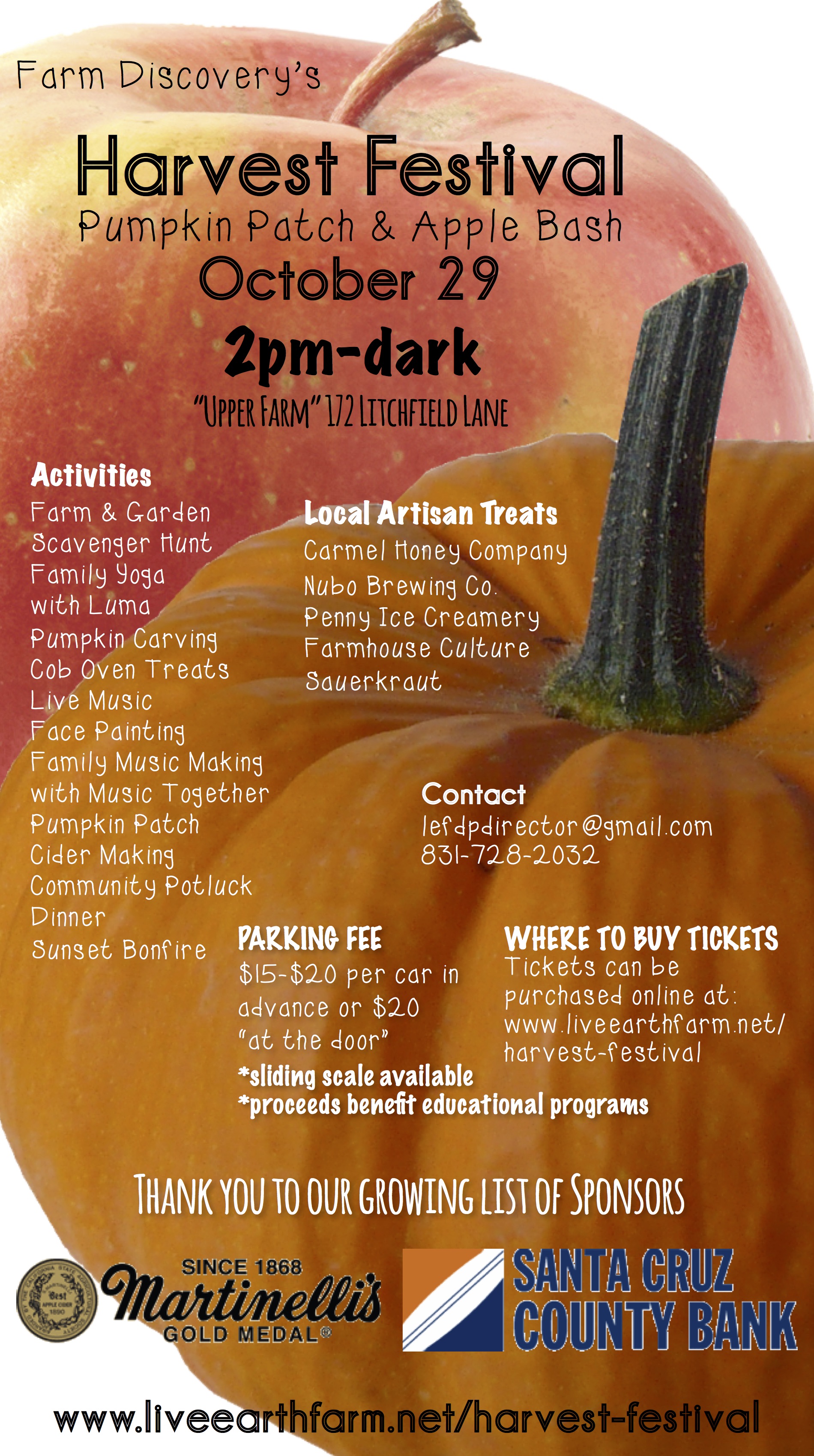
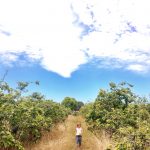 Farm Camp 2016: that’s a wrap!
Farm Camp 2016: that’s a wrap!
Summer Day Camps in 2016 went great. We had more campers than ever and thanks to generous donors and partner organizations we were able to offer more scholarships and financial aide to local kids who otherwise wouldn’t get the chance. Thank you Pajaro Valley Shelter Services, Second Harvest Food Bank, CASA, Loaves and Fishes, and to our many donors including, Scurich Insurance Services and Watsonville Coast Produce.
We think our Day Camp Program is especially impactful and effective at nurturing healthy relationships with food and nature. When kids can spend an entire week on the farm they are able to have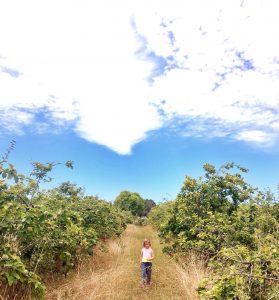 deeper and more transformational experiences. Spending a few minutes in a garden is fine, but spending several days working, exploring and playing with others in the garden creates a lasting memory. Campers created beautiful arts and crafts with natural materials. My favorite project this summer are found object mobiles. The campers enjoyed collecting redwood sticks, feathers, pine cones, flowers, seeds and lots of other objects on a farm adventure hike. Then they tied, glued, painted and hung them together in an amazing variety of ways. They even asked for extra time and spent several hours perfecting these creations.
deeper and more transformational experiences. Spending a few minutes in a garden is fine, but spending several days working, exploring and playing with others in the garden creates a lasting memory. Campers created beautiful arts and crafts with natural materials. My favorite project this summer are found object mobiles. The campers enjoyed collecting redwood sticks, feathers, pine cones, flowers, seeds and lots of other objects on a farm adventure hike. Then they tied, glued, painted and hung them together in an amazing variety of ways. They even asked for extra time and spent several hours perfecting these creations.
We had lots of great help again from out “Leaders in Training” teen camp councilors. Developing their leadership skills is one of our goals during camp. Seeing them achieve greater independence and gain confidence in their abilities throughout the week is rewarding. We also want to thank Willow Limbach and Claire Bruder, our two Junior Staff members who stepped up and took on much of the work of making camp so fun and full of activities.
Now, Fall Farm Tours are underway. Fall is such a great time for students to visit the farm. They can experience the changes in the trees and fields. And with apple season here, we are making apple cider with students who visit using our old-fashioned apple press, tasting lots of different kinds of apples and learning what it takes to grow this delicious and quintessential fall food. If you are interested in booking a tour, email education@farmdiscovery.org.
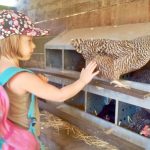 Summer Camp Highlights
Summer Camp Highlights
Here is a collection of photos from Farm Camp 2016! Find out more about our summer day camp program here.
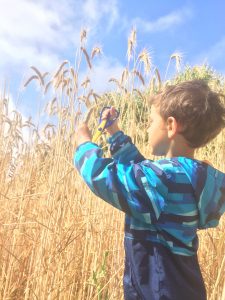
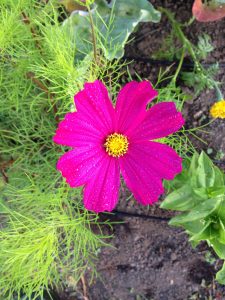
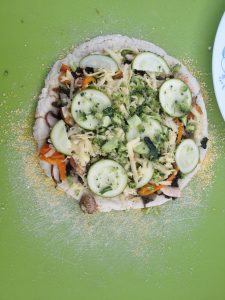
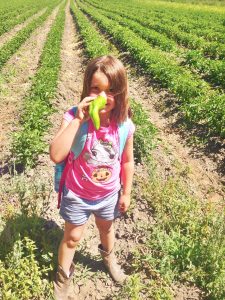
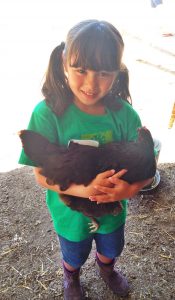
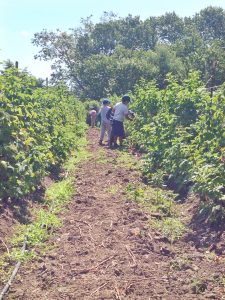
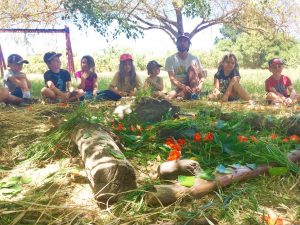
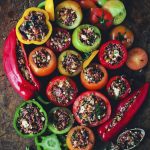 Stuffed Tomatoes and Peppers
Stuffed Tomatoes and Peppers
This dish is simple yet delectable dish. And with the tomatoes and peppers going off right now, this seems to be a great dish and one the kiddos will love to help with.
Ingredients:
2 lb mixed tomatoes and/or bell peppers (approx 15 vegetables, less if they are large)
Rice Mixture
2 cups of cooked rice, quinoa or your favorite grain
1-2 tbsp olive oil or coconut oil
1 red onion, peeled and finely chopped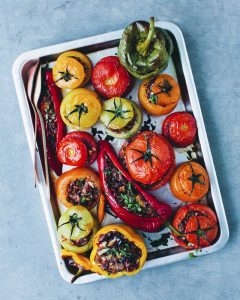
1 clove garlic, peeled and finely chopped
20 wrinkly black olives, pitted
2 tbsp pickled capers, drained
2 tbsp finely chopped fresh mint
2 tbsp finely chopped fresh parsley
1 handfull almonds, chopped
2 tbsp lemon juice
4 tbsp raisins or finely chopped dates
150 g /1 cup feta cheese (optional)
Yogurt sauce
1 cup natural yogurt
1 tbsp olive oil
2 tbsp lemon juice
2 tbsp finely chopped mint leaves
1 small clove garlic, peeled and finely chopped
salt and black pepper
Instruction:
Preheat the oven to 350°F
Trim off the top of each tomato. Use a small spoon to scrape out the seeds and flesh from the tomatoes and into a bowl. This is a great activity for the kids to help with. Slice each bell pepper lengthwise and discard the seeds, alternatively trim off each top and discard the seeds (depending on the shape of the pepper).
Heat oil in a skillet, add onion, olives and capers. Finely chop the tomato flesh and add it together with the seeds and liquid. Sauté for about 15 minutes until soft and fragrant, then transfer to the mixing bowl. Add the rest of the ingredients and stir to combine. Fill up the tomatoes and bell peppers with the stuffing, another great task for your young helpers. Place the caps back on top of the tomatoes and bell peppers. Place the vegetables in a greased ovenproof dish and bake in the oven for 30-35 minutes or until the tomatoes and bell peppers are soft, golden and have slightly burnt edges. Whisk together the ingredients for the yogurt sauce in a small bowl while the vegetables are in the oven.
Serve the stuffed vegetables with a drizzle of yogurt sauce and a simple side salad of choice. Enjoy!
This recipe was taken from Green Kitchen Stories
 Welcome our new Education Coordinator!
Welcome our new Education Coordinator!
Hayley Reitman is the newest addition to Farm Discovery at Live Earth! Hayley graduated with a degree in Environmental Studies from CSU Monterey Bay, focusing on sustainable communities in 2014. She has been working in nonprofits since 2010 with experience in environmental education, habitat restoration, community food programs and sustainable agriculture. Hayley is extremely excited to be part of Live Earth Farm’s Discovery Program and to continue a career of advocating for healthy food systems in our community.
 We are so pleased to welcome our new Development Coordinator, Tara Walker. She has already had many successes in getting her own network of friends and family connected to Farm Discovery.
We are so pleased to welcome our new Development Coordinator, Tara Walker. She has already had many successes in getting her own network of friends and family connected to Farm Discovery.
A longtime Santa Cruz resident, Tara has more than 12 years of development experience including several years doing donor stewardship at UC Santa Cruz. As a journalist, she has written about chefs, restaurants, and farms in Santa Cruz and Monterey counties. She lived in Santa Cruz from 1986-1991 when she earned a B.A. in creative writing from UCSC, and returned to Santa Cruz in 2004 after spending a few years in Texas (where she earned an M.A. in creative writing from UT Austin).
You can look forward to meeting Tara at one of the many food events she attends around our county or on June 27th, 2016 at Love Monday at Discretion Brewing where 20% of beer sales and a few signature dishes will raise money for Farm Discovery to empower youth to make great food choices.
 This Time Love Monday means Food AND Beer for Farm Discovery
This Time Love Monday means Food AND Beer for Farm Discovery
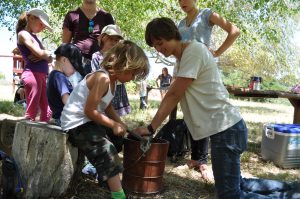 We are very excited to be supporting youth development by offering, for the very first time this summer, two junior staff positions. Junior staff learn to lead sustainable farming, and nutritious food preparation activities. They work with campers on the self-care that also supports healthy ecosystems, economies, and communities. We are preparing youth for well paying jobs in our community.
We are very excited to be supporting youth development by offering, for the very first time this summer, two junior staff positions. Junior staff learn to lead sustainable farming, and nutritious food preparation activities. They work with campers on the self-care that also supports healthy ecosystems, economies, and communities. We are preparing youth for well paying jobs in our community.
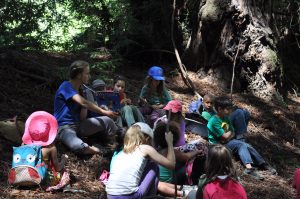 Thanks to some great generosity and with your help we will be able to pay these youth for their hard work. Please help us make our $5000 matching grant. Every new donor’s contribution will be matched. We are so grateful for every contribution of any amount.
Thanks to some great generosity and with your help we will be able to pay these youth for their hard work. Please help us make our $5000 matching grant. Every new donor’s contribution will be matched. We are so grateful for every contribution of any amount.
We need your help to fund these important positions. Contributions from new donors will be matched 1:1!
Junior staff receive paid summer job training. This enables the youth, who are former LIT’s or graduates of the Food What?! Program, to move into meaningful work while school is out of session. Junior Staff and LIT’s learn leadership and job skills in a supportive environment where they are challenged to take responsibility. In working with younger campers, the teens go back to school in the fall better prepared socially and academically, with work experience, greater awareness of their own strengths and areas for growth, and the skills to make healthy food choices.
At Farm Discovery summer camps, Junior Staff and LIT’s have the opportunity to grow real food, outside, with their own hands — alongside younger campers who thrive from their support. They further develop skills learned during their year in the Food What?! partnership by teaching campers to care for laying hens, milking goats and a dairy cow. They take raw ingredients from the fields to the kitchen, where they facilitate food preparation and preservation skills. Junior Staff hone healthy habits to share with their families and the skills to maintain such habits after camp is done.
Farm Discovery is able to offer these empowering positions for teens in part due to a matching grant from a local family foundation. Contributions from new donors will be matched 1:1 up to $5000 www.liveearthfarm.net/springfunddrive/
Spots are still available for Farm Discovery’s seventh summer camp season. Many activities are planned; all take place on the working farm and incorporate materials from 150 acres of organic fruits and vegetables. Past sessions have included making cheese, felting with wool, making take-home pickles and harvesting ingredients to assemble, then eat, delicious, farm-fresh salads. Campers also have opportunities to interact with our animals—including chickens and Bella, our milking cow—and even do animal chores like milking goats.
Summer 2016 sessions
June 13-17, Art on the Farm Camp – 9am-3pm – optional overnight on Thursday
June 20-24, Farm to Table Camp – 9am-3pm – optional overnight on Thursday
June 27-July 1, Sprouts Camp – 9am-noon – with OR without parent
July 11-15, Art on the Farm Camp – 9am-3pm – optional overnight on Thursday
July 18-22, Farm to Table Camp – 9am-3pm – optional overnight on Thursday
Sprouts Camp is for 3-6 year olds. All other camps are for 6-13 year olds. They are limited to 25 kids each to ensure a positive experience. A Leaders in Training program for teens, ages 14+ runs for each of the 5 weeks of camp.
 Spring Field Trip Season Brings New Schools
Spring Field Trip Season Brings New Schools
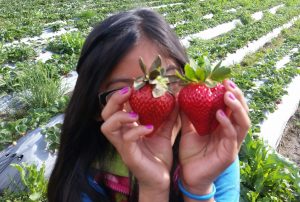 This Spring Field Trip season 12 different schools, over 32 classes and more than 650 students became farmers with us for a day or more. They learned to grow food and what they can do to participate in the food system in a positive way. Specifically they learned to sort their lunch waste and what the compostables can do for plants. They cared for the plants in our fields by top dressing them with finished compost. They learned how our farm animals contribute to the nutrient system the healthy food we grow depends on and they observed the decomposition process at work in our piles. It was one of our best and busiest springs.
This Spring Field Trip season 12 different schools, over 32 classes and more than 650 students became farmers with us for a day or more. They learned to grow food and what they can do to participate in the food system in a positive way. Specifically they learned to sort their lunch waste and what the compostables can do for plants. They cared for the plants in our fields by top dressing them with finished compost. They learned how our farm animals contribute to the nutrient system the healthy food we grow depends on and they observed the decomposition process at work in our piles. It was one of our best and busiest springs.
We received a grant from the Community Foundation of Santa Cruz County to bring 4th and 5th grade students from MacQuiddy to the farm for science based field trips. We developed a new field trip curriculum that reinforces some of the science content the students are learning at school. These students were full of energy and so eager to see all the different parts of the farm it was hard for us to keep up with them. After their full morning diving deep into compost, they were each made a pledge to recycle or compost more or to eat more fresh fruits and vegetables. They went back to school with a better understanding of the affect their choices have on the local food system, their community, and the natural environment.
Starlight Elementary sent four classes of 3rd graders to the farm this spring to learn about where healthy food comes from and how fresh fruits and vegetables can improve their nutrition and physical fitness. Sending students into our organic strawberry field is always one of our favorite activities. Eating sun-warmed strawberries from the field is the best lesson on freshness we know. Several kids in each class always ask if they can take some home to share with their family. Students learn first hand that these berries are sweet and full of vitamin C that improves their immune systems. Starlight students also visited our small herd of goats and our chicken flock. Third graders are learning first hand that some body parts, like feathers, horns, beaks, and hooves are uniquely adapted to improve the animals chance of survival and ability to thrive.
As part of the ongoing relationship with these schools we will be able to bring some of these same students back to the farm in the fall. They will get to taste the apples that they saw growing on the trees this spring. With more exposures to farm fresh fruits and vegetables students will continue to develop habits that will lead to stronger communities and healthier families.

